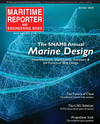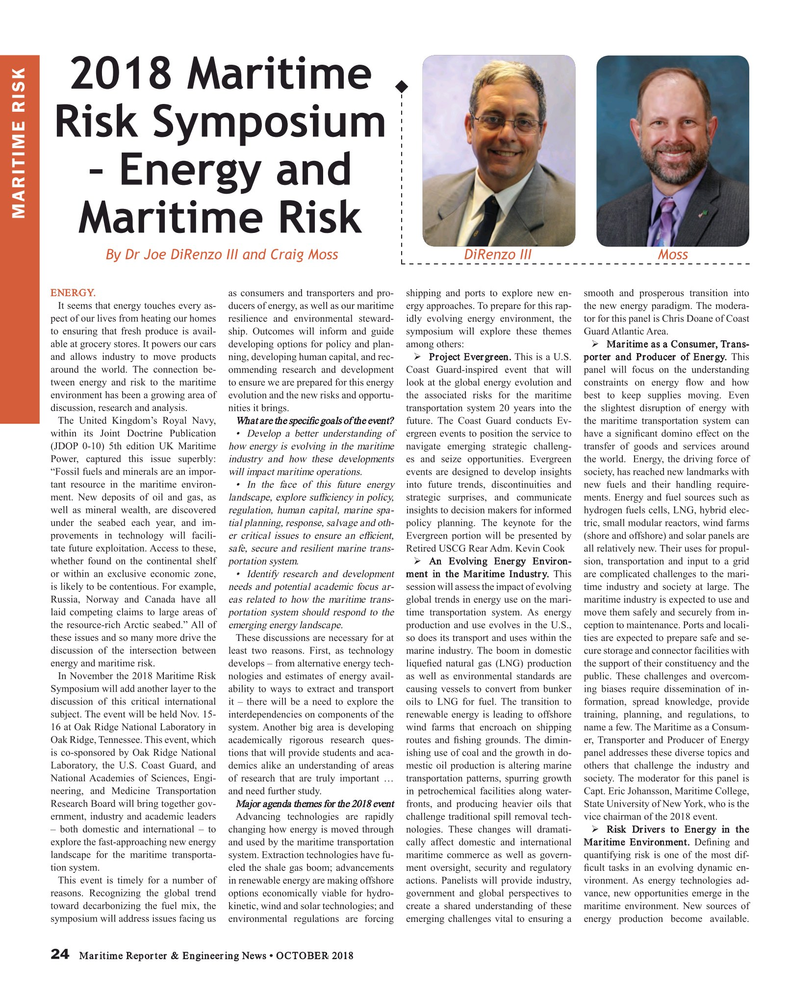
Page 24: of Maritime Reporter Magazine (October 2018)
Marine Design Annual
Read this page in Pdf, Flash or Html5 edition of October 2018 Maritime Reporter Magazine
2018 Maritime
Risk Symposium – Energy and
MARITIME RISK
Maritime Risk
By Dr Joe DiRenzo III and Craig Moss DiRenzo III Moss
ENERGY. as consumers and transporters and pro- shipping and ports to explore new en- smooth and prosperous transition into
It seems that energy touches every as- ducers of energy, as well as our maritime ergy approaches. To prepare for this rap- the new energy paradigm. The modera- pect of our lives from heating our homes resilience and environmental steward- idly evolving energy environment, the tor for this panel is Chris Doane of Coast to ensuring that fresh produce is avail- ship. Outcomes will inform and guide symposium will explore these themes Guard Atlantic Area. able at grocery stores. It powers our cars developing options for policy and plan- among others: ¾Maritime as a Consumer, Trans- and allows industry to move products ning, developing human capital, and rec- ¾Project Evergreen. This is a U.S. porter and Producer of Energy. This around the world. The connection be- ommending research and development Coast Guard-inspired event that will panel will focus on the understanding tween energy and risk to the maritime to ensure we are prepared for this energy look at the global energy evolution and constraints on energy ? ow and how environment has been a growing area of evolution and the new risks and opportu- the associated risks for the maritime best to keep supplies moving. Even discussion, research and analysis. nities it brings. transportation system 20 years into the the slightest disruption of energy with
The United Kingdom’s Royal Navy, What are the speci? c goals of the event? future. The Coast Guard conducts Ev- the maritime transportation system can within its Joint Doctrine Publication • Develop a better understanding of ergreen events to position the service to have a signi? cant domino effect on the (JDOP 0-10) 5th edition UK Maritime how energy is evolving in the maritime navigate emerging strategic challeng- transfer of goods and services around
Power, captured this issue superbly: industry and how these developments es and seize opportunities. Evergreen the world. Energy, the driving force of “Fossil fuels and minerals are an impor- will impact maritime operations. events are designed to develop insights society, has reached new landmarks with tant resource in the maritime environ- • In the face of this future energy into future trends, discontinuities and new fuels and their handling require- ment. New deposits of oil and gas, as landscape, explore suf? ciency in policy, strategic surprises, and communicate ments. Energy and fuel sources such as well as mineral wealth, are discovered regulation, human capital, marine spa- insights to decision makers for informed hydrogen fuels cells, LNG, hybrid elec- under the seabed each year, and im- tial planning, response, salvage and oth- policy planning. The keynote for the tric, small modular reactors, wind farms provements in technology will facili- er critical issues to ensure an ef? cient, Evergreen portion will be presented by (shore and offshore) and solar panels are tate future exploitation. Access to these, safe, secure and resilient marine trans- Retired USCG Rear Adm. Kevin Cook all relatively new. Their uses for propul- whether found on the continental shelf portation system. ¾An Evolving Energy Environ- sion, transportation and input to a grid or within an exclusive economic zone, • Identify research and development ment in the Maritime Industry. This are complicated challenges to the mari- is likely to be contentious. For example, needs and potential academic focus ar- session will assess the impact of evolving time industry and society at large. The
Russia, Norway and Canada have all eas related to how the maritime trans- global trends in energy use on the mari- maritime industry is expected to use and laid competing claims to large areas of portation system should respond to the time transportation system. As energy move them safely and securely from in- the resource-rich Arctic seabed.” All of emerging energy landscape. production and use evolves in the U.S., ception to maintenance. Ports and locali- these issues and so many more drive the These discussions are necessary for at so does its transport and uses within the ties are expected to prepare safe and se- discussion of the intersection between least two reasons. First, as technology marine industry. The boom in domestic cure storage and connector facilities with energy and maritime risk. develops – from alternative energy tech- lique? ed natural gas (LNG) production the support of their constituency and the
In November the 2018 Maritime Risk nologies and estimates of energy avail- as well as environmental standards are public. These challenges and overcom-
Symposium will add another layer to the ability to ways to extract and transport causing vessels to convert from bunker ing biases require dissemination of in- discussion of this critical international it – there will be a need to explore the oils to LNG for fuel. The transition to formation, spread knowledge, provide subject. The event will be held Nov. 15- interdependencies on components of the renewable energy is leading to offshore training, planning, and regulations, to 16 at Oak Ridge National Laboratory in system. Another big area is developing wind farms that encroach on shipping name a few. The Maritime as a Consum-
Oak Ridge, Tennessee. This event, which academically rigorous research ques- routes and ? shing grounds. The dimin- er, Transporter and Producer of Energy is co-sponsored by Oak Ridge National tions that will provide students and aca- ishing use of coal and the growth in do- panel addresses these diverse topics and
Laboratory, the U.S. Coast Guard, and demics alike an understanding of areas mestic oil production is altering marine others that challenge the industry and
National Academies of Sciences, Engi- of research that are truly important … transportation patterns, spurring growth society. The moderator for this panel is neering, and Medicine Transportation and need further study. in petrochemical facilities along water- Capt. Eric Johansson, Maritime College,
Research Board will bring together gov- Major agenda themes for the 2018 event fronts, and producing heavier oils that State University of New York, who is the ernment, industry and academic leaders Advancing technologies are rapidly challenge traditional spill removal tech- vice chairman of the 2018 event. – both domestic and international – to changing how energy is moved through nologies. These changes will dramati- ¾Risk Drivers to Energy in the explore the fast-approaching new energy and used by the maritime transportation cally affect domestic and international Maritime Environment. De? ning and landscape for the maritime transporta- system. Extraction technologies have fu- maritime commerce as well as govern- quantifying risk is one of the most dif- tion system. eled the shale gas boom; advancements ment oversight, security and regulatory ? cult tasks in an evolving dynamic en-
This event is timely for a number of in renewable energy are making offshore actions. Panelists will provide industry, vironment. As energy technologies ad- reasons. Recognizing the global trend options economically viable for hydro- government and global perspectives to vance, new opportunities emerge in the toward decarbonizing the fuel mix, the kinetic, wind and solar technologies; and create a shared understanding of these maritime environment. New sources of symposium will address issues facing us environmental regulations are forcing emerging challenges vital to ensuring a energy production become available. 24 Maritime Reporter & Engineering News • OCTOBER 2018
MR #10 (18-25).indd 24 MR #10 (18-25).indd 24 10/4/2018 9:06:30 AM10/4/2018 9:06:30 AM

 23
23

 25
25
